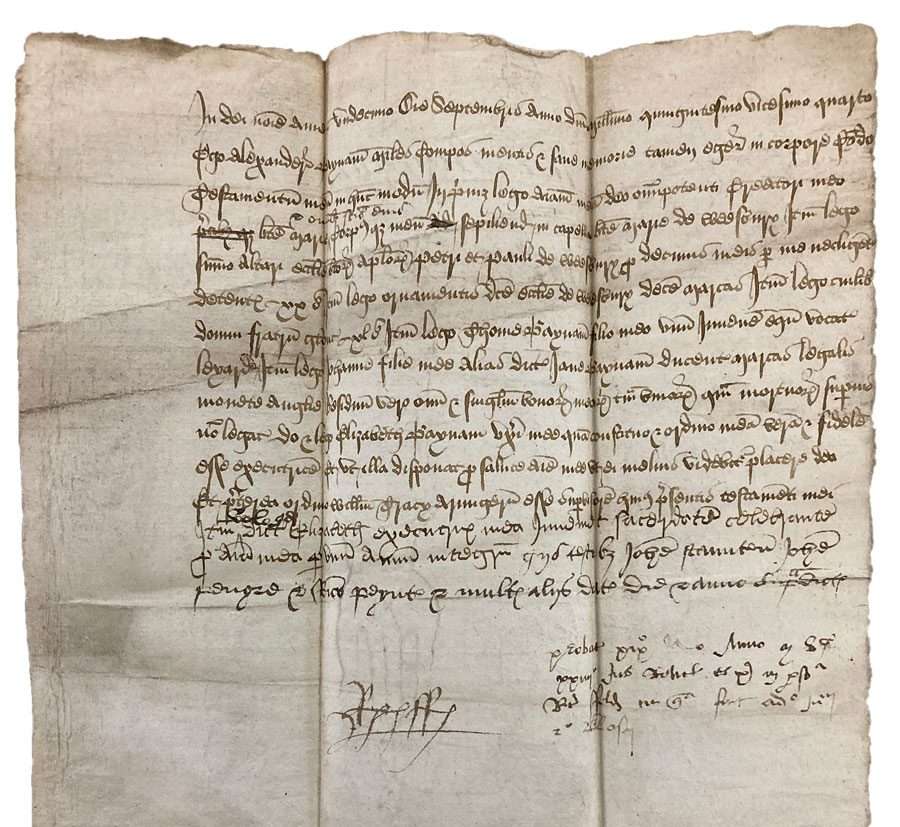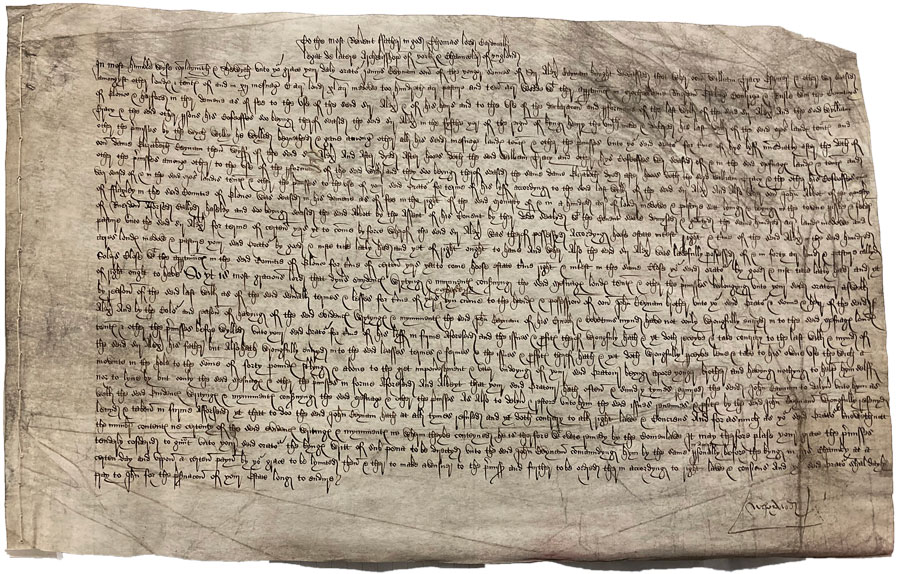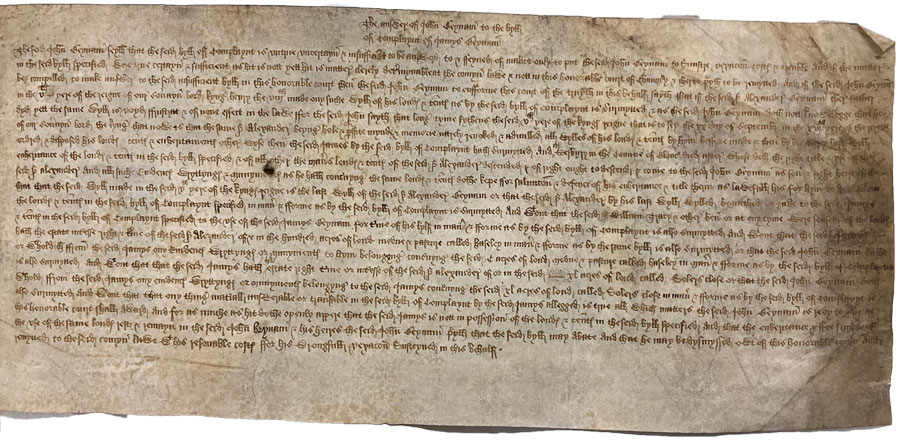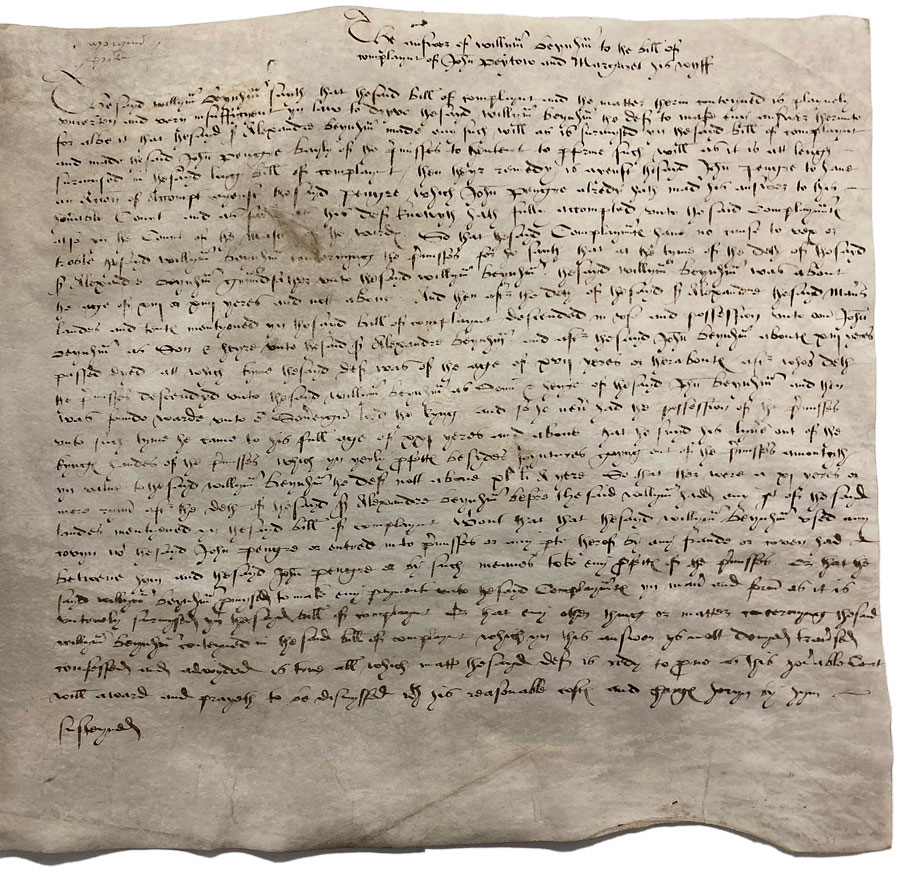Second Will of Sir Alexander Baynham - 1524
Alexander’s second will was made on 20th September 1524, just 5 days before he died.
It reads:
In the name of God, Amen. The twentieth day of September in the year of the Lord the thousand five hundred twenty-fourth,
I, Alexander Baynham, knight, sound of mind and memory but ill in body, make my testament in this manner:

First I bequeath my soul to Almighty God, my Creator, to Blessed Mary, and to all his saints, and my body to be buried in the chapel of Blessed Mary of Westbury;
I bequeath to the high altar of the church of the Blessed Apostles Peter and Paul of Westbury for my tithes by me negligently withheld 20s;
I bequeath to the ornaments of the said church of Westbury ten marks;
I bequeath to whatsoever house of brothers of Gloucester 40s;
I bequeath to Thomas Baynham, my son, one young horse called Leyard;
I bequeath to Joan, my daughter, otherwise called Jane Baynham, two hundred marks of lawful money of England;
The true residue of all and singular my goods, both live and dead above not bequeathed I give and bequeath to Elizabeth Baynham, my wife, whom I make and ordain to be my true and faithful executrix, and she to dispose for the salvation of my soul as to her shall seem good to the pleasure of God;
And moreover I ordain William Tracy, esquire, to be overseer of this my present testament;
I will that the said Elizabeth, my executrix, find a celebrant priest for my soul for one entire year;
These witnesses: John Staunton, John Pengre, & Richard Peynter, and many others.
Given the day and year abovesaid.
Probate of this second Will was granted on 19th November 1524, at St. Paul’s Cathedral in London, as follows:
The testament of the above-written deceased was proved before the forenamed Commissioners in the Cathedral Church of Saint Paul in London on the 19th day of the month of November in the year of the Lord the thousand five hundred 24th by the oath of Elizabeth, relict and executrix named in the same testament, in the person of Richard Field, proctor etc., and probated and entered, and administration was granted by the authority of the forenamed Most Reverend Fathers of all and singular the goods, rights and credits of the said deceased to the forenamed executrix in the person of the said proctor, sworn on the Holy Gospels to well and faithfully administer, and to exhibit a full and faithful inventory on the second day after the feast of Saint Blaise, Bishop, next to come, and also to render a plain and true account.
Check – [ C 142/42/106, 112 and PCC 27 Bodfelde, 27 Porch, dat. 20 Sept., pr. 19 Nov ]
Sometime after Alexander’s death, his youngest son James brought a case in the Court of Chancery, Six Clerks Office against his eldest brother John, Alexander’s heir. The case is recorded as Beynam v Beynam and concerns messuages and lands in Mitcheldean, Ruardean, Estbag [Eastbach], Coulrige [Coldridge] and Rusle as well as land called ‘Solers Close’ which had all been left by Alexander’s first will to James for life.


Another case concerning the execution of Alexander’s first will was brought in around 1540. It is recorded as Peytowe v Pengre and was brought by John Peyto and his wife Margaret who was the executrix of Dame Elizabeth Baynham, late wife and executrix of Sir Alexander. The defendants were John Pengre, bailiff of Alexander’s lands, and William Baynham, grandson and now heir (Alexander’s eldest son and heir, John, William’s father, had died in 1528). It concerned the payment due to Jane, Alexander’s youngest daughter out of the manors of Mitcheldean, Little Dean, Newnham, Ruardean and Eastbach (in English Bicknor) and lands in Coldridge (in Aston Ingham), Russheley (Reslaw in Aston Ingham?), Aston Ingham and Ledbury in both Gloucestershire and Herefordshire.

This is the same John Peyto who was granted a licence in 1513 to put lands into the hands of trustees, one of whom was the William Baynham who was Sir Alexander’s younger brother.
Acknowledgements:
- 1524 Second will of Alexander Baynham – National Archives, PROB 10/3
- 1528 Probate of Second (1524) Will of Alexander Baynham – National Archives, Prob. 11/21/469
- Transcript of 1524 Will – www.oxford-shakespeare.com © Nina Green 2016
